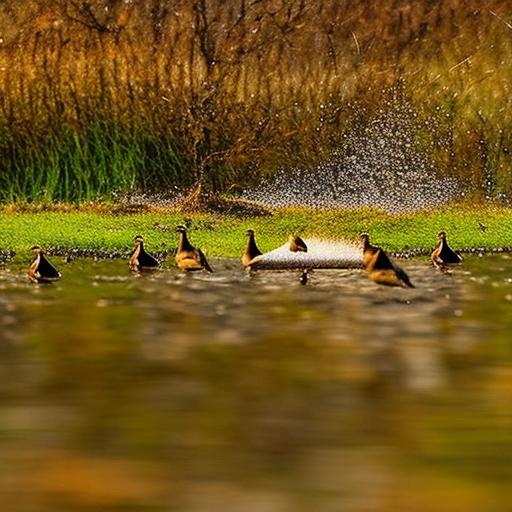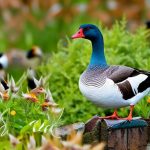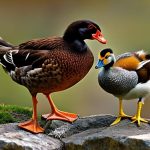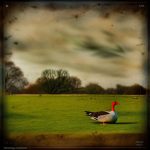Geese are large waterfowl that are known for their distinctive honking sound and V-shaped flying formation. They are found in various parts of the world and are known for their adaptability and intelligence. Geese are social animals that live in flocks and have a strong sense of community. They are also highly territorial and will defend their nesting sites and food sources vigorously.
Understanding the behavior of geese is important for several reasons. Firstly, it allows us to coexist peacefully with these birds and appreciate their beauty without causing harm to them or ourselves. Secondly, understanding their behavior helps us to effectively manage any issues that may arise when geese come onto our property. By understanding why they come onto our property and how they behave, we can implement strategies to deter them without causing harm.
Key Takeaways
- Geese are social birds that mate for life and can live up to 25 years.
- Geese come onto your property to feed, rest, and nest, especially near bodies of water.
- Geese can cause damage to your property, including grass, crops, and water sources.
- Natural ways to deter geese include planting certain vegetation, using decoys, and removing food sources.
- Physical barriers such as fences, netting, and hedges can also keep geese away.
Understanding the reasons why geese come onto your property
Geese come onto our property for several reasons, including food sources, nesting sites, and water sources. Geese are herbivores and feed on grasses, grains, and aquatic plants. If your property has an abundance of these food sources, it is likely to attract geese. Additionally, geese prefer nesting near water bodies such as ponds or lakes. If your property has suitable nesting sites, geese may choose to make it their home.
The negative impact of geese on your property
While geese can be beautiful creatures to observe, they can also cause negative impacts on your property. One of the main issues is property damage. Geese have a voracious appetite and can quickly strip an area of its vegetation, leaving behind bare patches of land. This can be particularly problematic if you have a well-maintained lawn or garden.
Another concern is the health risks associated with geese droppings. Geese droppings can contain harmful bacteria such as E.coli and Salmonella, which can pose a risk to human health. If you have children or pets that play on your property, it is important to be aware of this potential health hazard.
Lastly, geese can be noisy creatures, especially during their breeding season. Their honking can be disruptive and annoying, particularly if you live in close proximity to their nesting sites.
Natural ways to deter geese from your property
There are several natural ways to deter geese from your property. One method is to plant certain vegetation that geese find unappealing. Geese prefer short grasses and open spaces where they can easily spot predators. By planting tall grasses or shrubs, you can create an environment that is less attractive to geese.
Another method is to remove food sources. This can be done by regularly mowing your lawn to keep the grass short and removing any fallen fruits or seeds that may attract geese. Additionally, you can use decoys such as plastic owls or coyotes to create the illusion of a predator presence, which will deter geese from settling on your property.
Using physical barriers to keep geese away
Physical barriers can be an effective way to keep geese away from your property. Fencing is one option, but it needs to be at least 3 feet high and have small enough gaps to prevent geese from squeezing through. Netting can also be used to cover areas such as ponds or gardens, preventing geese from accessing these areas.
Floating barriers are another option for deterring geese from water sources. These barriers are placed on the water’s surface and create an obstacle that prevents geese from landing or swimming in the area.
Using sound and light to repel geese

Sound and light can be used as deterrents to repel geese from your property. Sonic devices emit loud noises that mimic the distress calls of geese or other predators, which can scare them away. Flashing lights can also be effective, as geese are sensitive to sudden changes in light and may be deterred by flashing lights.
Scarecrows can also be used to create a visual deterrent. These can be placed in areas where geese are likely to gather, such as near water sources or feeding areas.
Applying repellents to keep geese away
There are various repellents available that can be applied to deter geese from your property. Chemical repellents are available in the form of sprays or granules and contain substances that geese find unappealing. These repellents can be applied to areas where geese are likely to gather, such as lawns or gardens.
Natural repellents can also be effective in deterring geese. These include substances such as vinegar or garlic, which can be sprayed onto vegetation or around areas where geese are likely to gather.
Homemade repellents can also be made using ingredients such as chili powder or cayenne pepper mixed with water. These can be sprayed onto vegetation or applied to areas where geese are likely to feed.
Creating an uninviting environment for geese
Creating an uninviting environment for geese is another effective way to deter them from your property. This can be done by removing nesting sites, such as tall grasses or shrubs, and filling in any holes or depressions where geese may choose to nest.
Removing water sources can also discourage geese from settling on your property. This can be done by draining or filling in any ponds or pools that may attract geese.
Using landscaping techniques such as installing rocks or gravel around water sources can also make it difficult for geese to access these areas.
Seeking professional help to manage geese on your property
If you are unable to effectively manage geese on your property using the methods mentioned above, it may be necessary to seek professional help. Hiring a professional who specializes in wildlife management can ensure that geese are safely and humanely deterred from your property.
Professionals can offer a range of services, including habitat modification, population control, and the installation of deterrents. They can also provide advice on long-term strategies for managing geese and preventing them from returning to your property.
Conclusion and final tips for keeping geese off your property
In conclusion, understanding the behavior of geese and the reasons why they come onto your property is crucial for effectively managing them. By implementing natural deterrents, physical barriers, sound and light deterrents, repellents, and creating an uninviting environment, you can successfully keep geese off your property.
It is important to be proactive in managing geese and to address any issues as soon as they arise. Regular maintenance and monitoring of your property can help prevent geese from becoming a nuisance.
If you are unable to manage geese on your own, do not hesitate to seek professional help. Professionals have the knowledge and experience to effectively manage geese and can provide long-term solutions to prevent them from returning to your property.
If you’re looking for effective ways to keep geese off your property, you might also be interested in learning how to turn a shed into a chicken coop. This article from Poultry Wizard provides valuable insights and step-by-step instructions on transforming a shed into a functional and secure space for your chickens. By implementing the tips and techniques mentioned in this article, you can create a safe haven for your feathered friends while keeping unwanted geese at bay. Check out the article here to get started on your chicken coop project.
FAQs
What are some effective ways to keep geese off my property?
There are several effective ways to keep geese off your property, including using decoys, installing fencing, using repellents, and modifying the landscape.
What kind of decoys can I use to keep geese away?
You can use a variety of decoys to keep geese away, including predator decoys, swan decoys, and coyote decoys. These decoys can be placed in areas where geese are likely to congregate, such as near ponds or lakes.
What kind of fencing is best for keeping geese off my property?
The best type of fencing for keeping geese off your property is a tall fence that is at least six feet high. The fence should be made of a material that is difficult for geese to climb or fly over, such as chain link or welded wire mesh.
What kind of repellents can I use to keep geese away?
There are several types of repellents that can be used to keep geese away, including visual repellents, auditory repellents, and taste repellents. Visual repellents include scarecrows and reflective tape, while auditory repellents include noise-making devices. Taste repellents include sprays that make plants taste bad to geese.
How can I modify my landscape to keep geese away?
You can modify your landscape to keep geese away by removing any sources of food or water that may attract them, such as bird feeders or standing water. You can also plant vegetation that geese do not like, such as prickly bushes or tall grasses.
Meet Walter, the feathered-friend fanatic of Florida! Nestled in the sunshine state, Walter struts through life with his feathered companions, clucking his way to happiness. With a coop that’s fancier than a five-star hotel, he’s the Don Juan of the chicken world. When he’s not teaching his hens to do the cha-cha, you’ll find him in a heated debate with his prized rooster, Sir Clucks-a-Lot. Walter’s poultry passion is no yolk; he’s the sunny-side-up guy you never knew you needed in your flock of friends!







